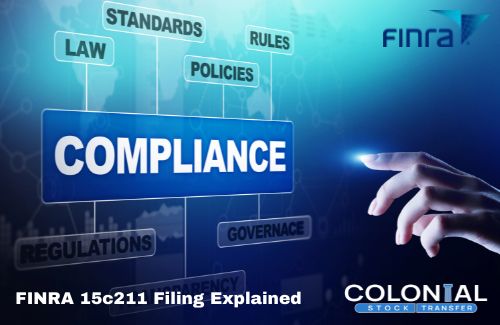
The FINRA 15c211 filing is a crucial process for market makers who wish to quote an unlisted security in the United States. This regulation is governed by the Financial Industry Regulatory Authority (FINRA) and ensures that all securities traded over-the-counter (OTC) meet certain transparency and regulatory compliance standards. It is essential for maintaining the integrity of financial markets and protecting investor interests.
An Overview of Filing FINRA 15c211
A FINRA 15c211 filing is a submission a market maker must make to FINRA to initiate or resume quoting a security not listed on standard exchanges, typically through OTC Markets. This filing is required to ensure adequate and accurate information about the issuer is publicly available. The regulation is in place to prevent fraudulent and manipulative practices. The form provides essential issuer information to the investing public. The goal is to maintain fair and orderly markets, which is crucial for investor confidence.
This form also impacts the liquidity and visibility of the securities involved. FINRA promotes transparency in the OTC markets by requiring disclosures through these filings. This process helps investors make informed decisions and supports the overall health of the financial ecosystem. Compliance with 15c211 is critical for any issuer looking to access a broader investment base through OTC trading.
The Process of Filing FINRA 15c211
The filing process for FINRA 15c211 starts when a broker-dealer submits this form to FINRA asking to quote a security in the OTC market. The broker-dealer must show that it has enough information about the issuer of these securities. This includes financial statements and details of the company’s business model and management. The filing will be reviewed and, if deemed compliant with SEC regulations, the broker dealer can start quoting this security on the OTC market.
Role of Market Makers
Market makers play a pivotal role in the 15c211 filing process. They are responsible for submitting the necessary documentation to FINRA. They facilitate securities trading by providing liquidity, setting the bid, and asking prices.
Without their participation, certain securities would be challenging to trade freely in the OTC market. Market makers ensure that the securities they quote meet all regulatory requirements, which in turn helps maintain a stable trading environment.
In addition to their submission duties, market makers must conduct due diligence to verify the information provided by the issuers. They must ensure that all disclosures are accurate and complete to protect investors from potential fraud.
This responsibility highlights the critical role of market makers in safeguarding market integrity and investor trust. Their proactive engagement in the 15c211 filing process is essential for the smooth operation of the OTC markets.
Current Requirements for 15c211 Filings
The requirements for a 15c211 filing include several critical elements:
| Requirement | Description |
| Issuer Eligibility | The issuer must meet FINRA criteria for public trading, including recent financial statements and company operation details. |
| Disclosure of Material Information | Mandatory full disclosure of information that affects investor decisions, including financial health, operations, and legal issues. |
| Regular Updates | Continuous updates are required to keep the filing current, including reporting significant changes in the issuer’s condition or operations. |
| Disclosing Ownership | Disclosure of significant ownership and control structures to reveal potential conflicts of interest to investors. |
| Compliance with Security Laws | Must follow all relevant securities laws and regulations to protect investors and maintain market integrity. |
OTC Markets’ Unique Position in 15c211 Filings
OTC Markets Group is a key player in the 15c211 filing landscape. As a market operator and participant, OTC Markets provides platforms where these securities are traded and will help issuers and market makers with compliance. They ensure that the securities meet the required standards before they are available for trading.
This not only facilitates the compliance process but also enhances the overall efficiency and transparency of the market. Because they play the role of both a facilitator and a regulator, they can influence the development and implementation of market standards.
Challenges in the Filing Process
Navigating the 15c211 filing process presents several challenges. A few key examples include:
- The process involves intricate legal and regulatory requirements, and understanding and adhering to these regulations requires expert legal and financial consultation.
- Expenses related to preparing and submitting a 15c211 filing include legal fees, administrative expenses, and the potential need for additional compliance staff.
- The filing process is often lengthy and detailed, and delays can impact a company’s plans to go public or expand its investor base.
- Few firms possess the necessary knowledge to navigate the 15c211 filing, which can limit the number of companies able to utilize this route effectively.
- Market conditions can change during the lengthy filing process, which can affect the success of the public offering or the trading performance of the security.
These challenges underline the need for thorough preparation and expert guidance when undertaking a 15c211 filing.
How To Decide If You Need To File FINRA 15c211
Deciding whether to file a FINRA 15c211 hinges on several criteria. Primarily, they concern the nature of the company’s goals and its securities. Companies seeking to expand their investor base through public OTC markets must comply with this filing to ensure transparency and regulatory adherence. This is a key process for a company with no existing listings on major exchanges but looking to attract more investors.
Furthermore, companies need to think about whether they are ready to meet stringent regulatory demands and maintain the required level of transparency post-filing. Companies must also assess their financial and administrative capacity to handle the complexities of a 15c211 filing.
Consulting with financial advisors and legal experts is smart. They can help companies work through this decision-making process effectively and ensure that all regulatory requirements are met for a successful filing.



